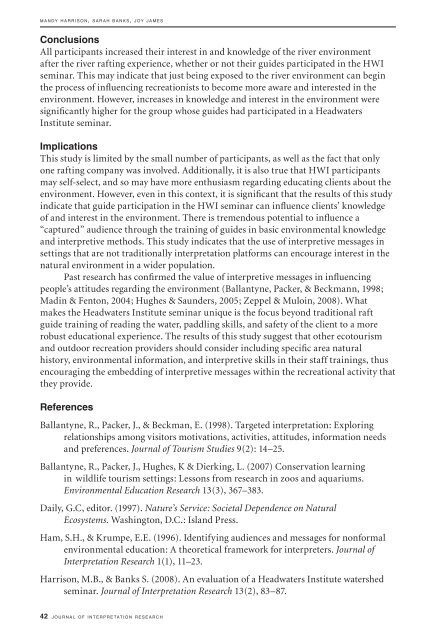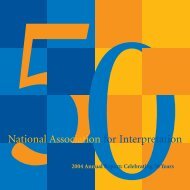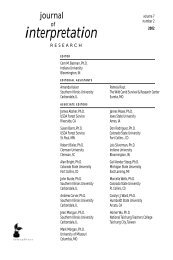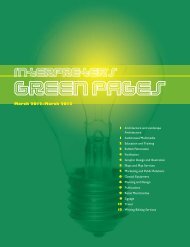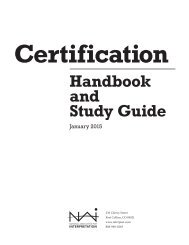interpretation
Volume 15, Number 1 - National Association for Interpretation
Volume 15, Number 1 - National Association for Interpretation
You also want an ePaper? Increase the reach of your titles
YUMPU automatically turns print PDFs into web optimized ePapers that Google loves.
m a n d y h a r r i s o n , s a r a h b a n k s , j o y j a m e s<br />
Conclusions<br />
All participants increased their interest in and knowledge of the river environment<br />
after the river rafting experience, whether or not their guides participated in the HWI<br />
seminar. This may indicate that just being exposed to the river environment can begin<br />
the process of influencing recreationists to become more aware and interested in the<br />
environment. However, increases in knowledge and interest in the environment were<br />
significantly higher for the group whose guides had participated in a Headwaters<br />
Institute seminar.<br />
Implications<br />
This study is limited by the small number of participants, as well as the fact that only<br />
one rafting company was involved. Additionally, it is also true that HWI participants<br />
may self-select, and so may have more enthusiasm regarding educating clients about the<br />
environment. However, even in this context, it is significant that the results of this study<br />
indicate that guide participation in the HWI seminar can influence clients’ knowledge<br />
of and interest in the environment. There is tremendous potential to influence a<br />
“captured” audience through the training of guides in basic environmental knowledge<br />
and interpretive methods. This study indicates that the use of interpretive messages in<br />
settings that are not traditionally <strong>interpretation</strong> platforms can encourage interest in the<br />
natural environment in a wider population.<br />
Past research has confirmed the value of interpretive messages in influencing<br />
people’s attitudes regarding the environment (Ballantyne, Packer, & Beckmann, 1998;<br />
Madin & Fenton, 2004; Hughes & Saunders, 2005; Zeppel & Muloin, 2008). What<br />
makes the Headwaters Institute seminar unique is the focus beyond traditional raft<br />
guide training of reading the water, paddling skills, and safety of the client to a more<br />
robust educational experience. The results of this study suggest that other ecotourism<br />
and outdoor recreation providers should consider including specific area natural<br />
history, environmental information, and interpretive skills in their staff trainings, thus<br />
encouraging the embedding of interpretive messages within the recreational activity that<br />
they provide.<br />
References<br />
Ballantyne, R., Packer, J., & Beckman, E. (1998). Targeted <strong>interpretation</strong>: Exploring<br />
relationships among visitors motivations, activities, attitudes, information needs<br />
and preferences. Journal of Tourism Studies 9(2): 14–25.<br />
Ballantyne, R., Packer, J., Hughes, K & Dierking, L. (2007) Conservation learning<br />
in wildlife tourism settings: Lessons from research in zoos and aquariums.<br />
Environmental Education Research 13(3), 367–383.<br />
Daily, G.C, editor. (1997). Nature’s Service: Societal Dependence on Natural<br />
Ecosystems. Washington, D.C.: Island Press.<br />
Ham, S.H., & Krumpe, E.E. (1996). Identifying audiences and messages for nonformal<br />
environmental education: A theoretical framework for interpreters. Journal of<br />
Interpretation Research 1(1), 11–23.<br />
Harrison, M.B., & Banks S. (2008). An evaluation of a Headwaters Institute watershed<br />
seminar. Journal of Interpretation Research 13(2), 83–87.<br />
42 j o u r n a l o f i n t e r p r e t a t i o n r e s e a r c h


